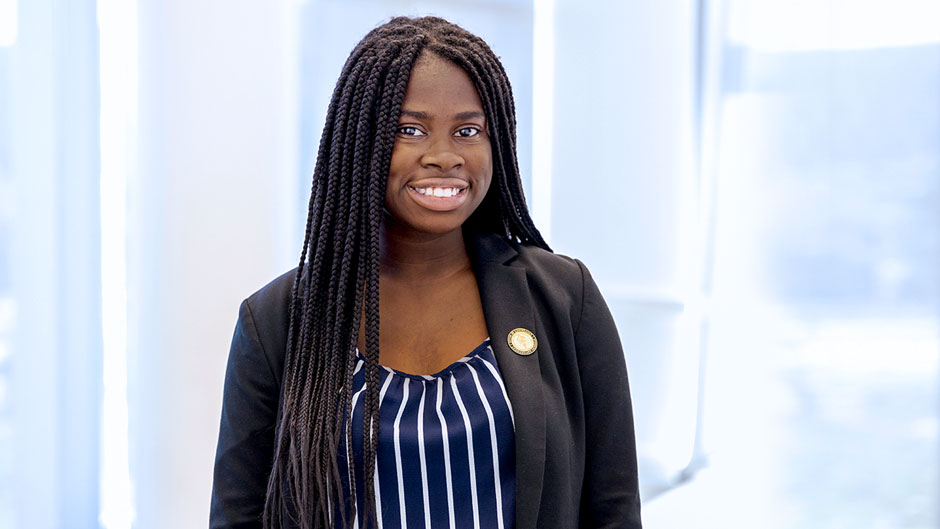Ajiri Uzere spent the first 14 years of her life living between both Egypt and London before later immigrating with her parents to a small town in Arkansas. While growing up there, she recalled not being afforded the opportunity to know any adults who were pursuing a career in international affairs.
At that time, she was eager to repair the systemic and social issues in the world, so after being accepted into the University of Miami—nearly 1,400 miles from home—she set out on a journey to become the adult she needed as a child.
“When we moved, my parents and I had so little experience with the systems in the United States and the different pathways to careers, nor did we interact with individuals who have these types of careers I was interested in,” said Uzere, who is vice president of Student Government. “Being a first-generation student and being Nigerian, it’s always been, ‘Be a lawyer, be a doctor, or be an engineer.’ ”
She explained that the encouragement to pursue one of those three careers is not because of the salaries which they come with, but because of a lack of exposure to other pathways to success. Her mission is to change that for future generations who are of African descent.
Now a senior, Uzere double majors in political science and psychology with minors in Spanish and public health while working assiduously to forge her own path in international development. Recently, she was accepted into the prestigious Charles B. Rangel International Affairs Summer Enrichment Program. The six-week program is designed to provide undergraduates around the nation with a deeper appreciation and understanding of careers in international affairs and to enhance their skills and knowledge to pursue those careers.
“The Office of Academic Enhancement gave me a fighting chance to get through the program’s rigorous application process,” said Uzere, who is one of 20 undergraduates across the country accepted as a Rangel Scholar this year.
“I always start my meetings with lots of questions—I want students to feel comfortable talking about themselves and their interests in earnest,” said April Dobbins, director of prestigious awards and fellowships in the Office of Academic Enhancement and a mentor to Uzere.
“In our first meeting, Ajiri spoke of her academic interests, life experiences, and even her family history. It was evident that she was a competitive candidate,” Dobbins said, pointing out that it is normal for qualified students who come through her office to feel that they aren't strong enough to apply. In turn, Dobbins uses her own experiences to motivate and relate to students like Uzere.
According to Dobbins, Uzere’s academic and extracurricular track record, passion, and focus, made it easy for the office’s team to enthusiastically endorse her. “One thing that set her apart was that she had done her research on all awards of interest,” Dobbins added. “She’d thoroughly reviewed our website and came with questions specific to her interests.”
Armed with additional confidence, Uzere said she is certain that everything she’s involved in today will permit her to fulfil her destiny of implementing programs that provide health care access to underserved communities around the globe.
“I want to make sure young girls aren’t missing out of school because they don’t have access to water to take a shower . . . or a baby doesn’t die because of a parent’s lack of education about vaccinations,” she said. “My dream is to be on the ground, crafting policy and working with governments to make sure that things are actually changing for the better.”
Uzere credits this clearer vision to being involved in diverse extracurricular programs and activities at the University. During her sophomore year, she was a participant in the Butler Center for Service and Leadership’s third annual cohort-style program, Leadership UMiami. While exploring Washington, D.C. through the program, discovering concepts related to democracy and social change, she learned about her “dream career.”
“That experience honestly shifted my perspective on my career path completely because it was the first time. I’d been exposed to a group of people who are interested in foreign policy and public service but not from a law perspective,” said Uzere.
This summer, as Uzere sets off on her newest venture, she urges younger students with similar beginnings as herself to be open-minded, research as much as possible before settling on a career, network with like-minded individuals, and recognize and confront feelings associated with imposter syndrome—a psychological pattern in which a person doubts their skills, talents, and accomplishments—the moment they may arise.
“Applying to the Rangel Scholar program really taught me that what is for you will be for you,” said Uzere, who was in a state of shock when she read the email notifying her of her acceptance into the program. “I think about the people who have poured into me since I wanted to pursue this program—like Mr. [Christopher] Clarke [director of the Office of Multicultural Student Affairs], and the number of people who were on that Google document helping me edit my personal statement.”
Uzere said she is grateful for the community of people at the University who have helped her realize she is worthy of great opportunities and a bright future in an industry she loves. She’s elated to learn more and grow through the Rangel Scholar program this summer.
“I know exactly what it’s like to want to do something so badly, but because you don’t know who to turn to, you feel like you can’t do it,” she said. “I want to be able to help someone like myself who needed answers. I will sit down with you for hours and share with you exactly the steps I took from my own experience.”
Students interested in applying for prestigious awards can explore scholarship listings at oae.miami.edu or email prestigiousawards@miami.edu.

